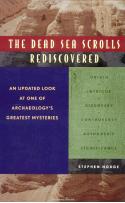Issue Date: May 7, 2004
Reviewed by FRANCIS J. MOLONEY The discovery, most likely in 1947, and the eventual publication and interpretation of the so-called Dead Sea Scrolls have never ceased to attract attention. There are many reasons for this. Their accidental discovery, the sometimes-shady deals that were negotiated between Bedouin shepherds, dealers in antiquities, ecclesiastical dignitaries, scholars and even political figures are all raw materials for a first-rate adventure novel. Indeed, some of the speculation and theories that have been aired over the past 50 years run close to being adventure novels. This book is not one of them. The author, an authority on Eastern religions with two published books on Zen Buddhism, has attempted to lead a non-specialist reader through the substantial contribution that the Scrolls have made to our knowledge of first-century Judaism and the emergence of Christianity. That is his major concern. However, he also considers, with a certain lightness of touch, the many theories -- some of them highly speculative and even fanciful -- that have had an impact on research and often made it to the front pages of international media. The recent much-publicized delay of the complete publication of the scrolls is an excellent example, and he handles this issue with balance. There can be no excuses, but the delay cannot be laid at the door of a political cover-up by the Catholic church. The opening section of this book is dedicated to a rapid reconstruction of the world that produced the community at Qumran and their documents. Hodge makes a few errors on the way: Herod Antipas’ slaying of John the Baptist is accepted as it is reported in the Gospels, while Josephus tells it quite differently (Antiquities 18.116-119); there were probably not “tens of thousands” slain at the fall of Jerusalem, and Aramaic is not a product of the Babylonian exile. But these details need not distract from the well-paced narrative that sets the scene for the discussion of Qumran and its scrolls. The presentation of the scrolls themselves is balanced. At Qumran, copies of biblical texts, writings that came from the community, and others accepted by the community have been found. The biblical texts have provided us with Hebrew texts of the Bible 1,000 years older than those previously used for the construction of the Hebrew Bible. The other texts, some of which are not texts from the community but treasured at Qumran (nonsectarian texts), and others that are the product of the members of the community (sectarian texts) give us a splendid view of a sectarian form of Judaism that throws great light on the Judaisms of the first century -- among them, emerging Christianity. Debates rage over the identity of the community, and Hodge handles this with care. He devotes a fine chapter to the present state of the research surrounding the archeology of the site at Qumran, and from there surveys various opinions about the identity of the community. At the end of an evenhanded survey of a number of scholarly and popular opinions, he carefully accepts the majority view that the community was made up of Essenes. The book closes with a careful reminder that the figure of “the Messiah,” as it was understood in Palestine in the first century, is very different from some contemporary Christian uses of the word “the Christ” (the Greek translation of the Hebrew “Messiah”), many of which have led to fanaticism and intolerance. In these days of fanciful reconstructions of early Christianity that range from the incredible reception of Dan Brown’s imaginative page-turner, The Da Vinci Code, to Mel Gibson’s highly subjective “The Passion of the Christ,” it is encouraging to see someone willing to write a solid, right-headed, balanced and easy-to-read presentation of the most substantive modern contribution to our understandings of Judaism and Christianity: the discovery of the Dead Sea Scrolls. I close with an example of what I mean by that statement. Hodge is rightly critical of much of the early work done on both the archeology of the site and the interpretation of the scrolls, under the direction of Dominican Fr. Roland de Vaux. Yet, in the end, despite all that has been said and done since those heady days in the 1950s, de Vaux’s contribution and conclusions are given due recognition. I recommend this book to anyone genuinely interested in the origins of contemporary Judaism and Christianity. Fr. Francis J. Moloney is dean of the School of Theology and Religious Studies at The Catholic University of America. National Catholic Reporter, May 7, 2004 |
